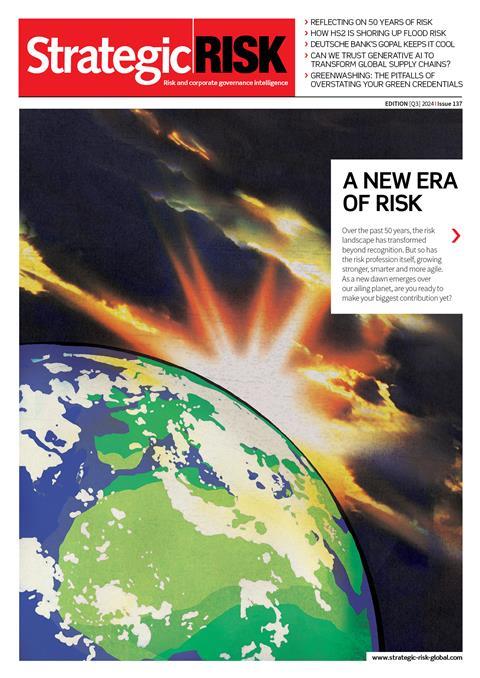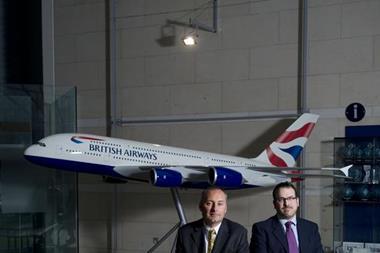Allied World Assurance Company (AWAC), established in Bermuda two years ago, began underwriting in the London market last April. Sue Copeman interviews Michael Baldwin, managing director, AWAC (Europe) Ltd
Why and how was AWAC formed?
MICHAEL BALDWIN: It was a move to enhance capacity in response to the hard market that rapidly accelerated after the events of September 11. It brought together a combination of investors, the principal ones being AIG, Chubb and Goldman Sachs. These were followed by others, including Swiss Re.
The company originally started out with just four people - three in Bermuda and myself in London - and began underwriting in Bermuda on 3 December 2001. During our first year in London we operated purely as a representative office in contact with the London wholesale market. This developed successfully to the point where we formed a European subsidiary (AWAC Europe Ltd) in Ireland. This opened up a branch very recently in London to give AWAC Europe a full underwriting commitment to the London market. The demand was there right from day one.
Why did your insurer partners invest in AWAC rather than using this capital to increase their own capacity?
MICHAEL BALDWIN: There was an opportunity to gain access to a broader distribution that would not necessarily be tapped into by the different partner insurance companies. For North American risks, the retail brokers will typically go to primary players in North America. If they are looking for additional capacity - and this has been incredibly short - they go to excess surplus lines writers in the US market and also to Bermuda for additional fresh capacity. Without a vehicle in Bermuda, an insurer would not have access to that distribution channel.
Why did you incorporate in Bermuda?
MICHAEL BALDWIN: The regulatory structure in Bermuda allows you to organise very quickly; we were able to carry out all the necessary regulatory compliance required to set up the company effectively in a six week period. The island provides favourable tax treatment. Also Bermuda is already an existing market, having been born out of capacity crunches in 1986 and 1992.
Why are you now underwriting in London?
MICHAEL BALDWIN: Initially, the focus of the company was on the indigenous North American business flowing into Bermuda and also marketed through London. However, our interest developed in building a book of business involving the large UK and European corporate sector, which is why we have established our London market underwriting facility.
London is still, and I think always will be, a critically important market for risk transfer capacity. The kind of customers that we are looking to service use London because of that. We are building a team of people with London market experience who are well known in this market. We've been committed to the London market in different roles from the start.
What type of business does AWAC underwrite?
MICHAEL BALDWIN: We write excess property and casualty business, generally coming in at a fairly low attachment point where there is a good reward for risk. We focus on the large corporate sector, including some of the more hazardous exposures such as power installations, oil and gas, petrochemicals and heavy primary industries such as pulp and paper. The criterion is whether we feel we can underwrite the risk and get a reasonable reward for the risk we take. And of course we also write large commercial as well as industrial risks.
On the casualty side we have moved into writing professional liability, principally D&O and E&O. While clearly this kind of business has produced some real problems in the past, the opportunity to write it not just at today's prices but also on today's policy wordings and terms provides a much better chance of profitability.
There are some classes that we don't write because we don't have the necessary skills in house. Employer's liability is an example. It is a peculiarly UK exposure, and any insurer involved in this market must have people who understand the exposures and can price the business adequately.
As we have evolved we have looked at all these different opportunities and, we believe, have selected the ones where we have the expertise and consider there is a reasonable possibility of a sensible return for the investment we make. You cannot do everything so you have to prioritise.
As property rates begin to plateau, will we see a return to a soft market?
MICHAEL BALDWIN: I think that property premiums peaked early this year. There may be some under-cutting but not by AWAC. For example, there has been a major drop in price for some risks compared to last year and we have rejected these as not producing a fair reward for the risk we are being asked to assume. The companies that were doing the cutting were not Bermudan companies or Irish companies with UK branches.
What do you require from your corporate clients?
MICHAEL BALDWIN: Naturally, we want access to full underwriting information. Given the level of capitalisation that we have and the size of the line that we write, we are dealing with the larger kind of corporation that will almost always have a dedicated risk manager or risk management team. We are looking at corporations with sales of £2bn plus, so they will have sophisticated risk management programmes. Although we normally deal through a broker, we view meeting risk managers to discuss their business as very important. Also, as the broker has often been bringing us in as a first time player in the last 12 to 18 months, risk managers usually like to talk to us.
Stability is crucial for risk managers. Will AWAC be a long term player?
MICHAEL BALDWIN: This question reminds me of a recent flight back from Bermuda when I overheard two financial journalists discussing the companies that they had visited. One said words to the effect of "Not all these companies are going to be around in 10 years time but I bet you that Allied World will be!"
I would certainly say that we are here for the long haul. We have built up our physical and other infrastructures to service this business, not just for a six or 12 month period but for the long term future. One of the first things we did was to sign a multi-year lease on our building in Bermuda. That is an indication of our commitment.
Sue Copeman is editor, Strategic Risk


















